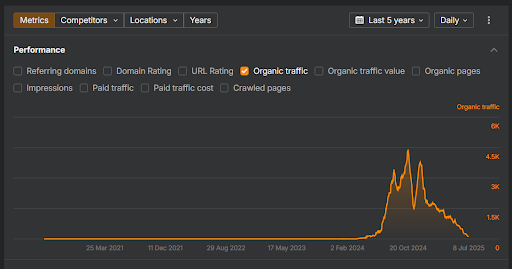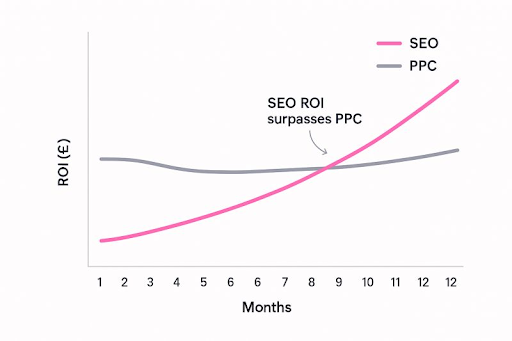TL;DR
- Product-market fit must be rock solid before investing in SEO
- SEO isn't "free traffic" - it demands massive time investment
- Validate that your audience actually searches on Google for solutions
- Focus on faster-impact channels first, run SEO passively in background
If you’re thinking about launching a startup, naturally, one of the questions you’ll ask yourself is what growth channels are best for marketing.
I’m sure SEO has popped up on that list from time to time.
Now, while SEO is quite literally in my site title, I’m actually going to be making the argument of why you should prioritize other channels first before moving on to SEO.
Is SEO worth investing in as an early-stage startup?
Unfortunately, I can’t give you a definitive answer.
But I can help you figure it out.
There are so many variables affecting whether SEO is right for you.
It depends on:
- Your audience
- Your product
- Your industry
- Your budget
- Competition
- And so on
And you need to have clear, realistic expectations about what it can and can’t do.
I’ve found that super early-stage startups get shiny object syndrome from SEO.
It seems like it brings in free traffic, and that it’s a perfectly scalable channel with AI.
But both expectations are wrong.
While organic search isn’t pay to play, you do pay with your time. And time will be the biggest investment for SEO.
Plus, it’s easy to fall into the trap of thinking AI can scale your content production.

I’ve seen sites take this approach, only to have their site traffic tank because of a Google penalty.
That’s not to mention how much can go wrong as an early-stage startup that can entirely derail your SEO efforts.
Like:
- Needing to change your content strategy because of a changing product
- Underestimating how much time and effort SEO takes as a new business, and relying too heavily on it before you can support a long-term strategy
- Having too limited of a marketing team to support an SEO strategy (and that’s if you even have a marketing team).
Because of how risky it can be, I usually advise startups to keep SEO in the back of their minds while including a mix of other channels that are less risky and less time-consuming.
When SEO will be the right channel to focus on
For startups, especially, the stars have to align for it to be the right time to invest in SEO.
Whenever an early-stage startup approaches me for SEO services, I usually gauge them on these factors.
Product-market fit
Do you feel comfortable in the positioning of your product? How likely is it for the positioning to change? I’ve seen entire content strategies thrown away due to an unstable product-market fit.
I can’t overstate how important it is for your product to be stable with its positioning, messaging, and purpose before moving on to SEO.
Industry opportunity
Is your audience actively looking for solutions on Google Search, or are they active elsewhere (social media, Slack channels, Reddit, etc)?
Audience research will be the core of your marketing and SEO strategy. If we can validate that your audience is actually searching for your services on Google through audience research, then SEO is possibly a channel to continue with.
If your ICP’s buyer’s journey is a bit more complex, and involves channels beyond search like podcasts, social media, and industry events, then SEO may not be the right channel starting out.
Vision of SEO
What is your long-term goal with SEO? Are you trying to capture early users for your product? Build brand awareness? Increase traffic to your site?
Just saying “I want to do SEO” isn’t enough. You need to have a specific goal in mind that validates whether SEO will be the right channel for you.
Value of other marketing channels
Is SEO worth doing if you have better channels at your disposal? Where are you seeing the most impact so far?
Where are final decisions ultimately happening?
How much time would it take to influence that final decision? Before validating SEO as a channel, you’ll need to ask yourself these questions and gauge whether they’re low-lift/high-reward. Sometimes SEO is that channel, and sometimes it’s not.
Total available search market
How large is the search market you’ll be targeting?
This is to gauge whether you have an active market to target through organic search and how much of it you can likely cover.
If your TAM is non-existent, then it’s usually best to focus on other channels starting out.
So what does this all mean?
There’s really no definitive right time when it comes to investing in SEO.
It all comes down to those factors listed above.
I’d say the biggest hurdle you have to clear first is product market fit and validating whether your audience is active on search, and measuring that against other marketing channels at your disposal.
Especially with how time and resource-intensive SEO is, you need to have a firm product-market fit that is 100% stable in:
- Who the product is for
- Your audience and that they can directly benefit from your product
Realistically, what you need is a “search market fit,” which is proof that users are actively searching on Google for solutions that your product can act as.
How a startup should balance its marketing mix
Chances are, there are other channels at your disposal that you’ll want to focus on as an early-stage startup.
Since there are a few different variables for how a startup should approach marketing, I’m going to break them down by bootstrapped startups and funded startups.
Bootstrapped startups
Bootstrapped founders need to be lean with their strategies, spending, and tactics.
In this case, the channels you’ll want to focus on will likely be organic ones.
Meaning, you’re organically marketing with content to either capture demand or build it.
SEO can certainly be one of these channels.
But it still shouldn’t be a main priority channel.
Instead, I’d run SEO a bit more passively in the background as a slow burn while also focusing on:
- Doing founder-led posting on LinkedIn: Posting your journey of building your product for people to follow on LinkedIn
- Looking out for Reddit threads where they can plug in their expertise or product: Reddit is a top choice for users looking for solutions. When relevant, you can plug your product into certain threads to build awareness for your product. A lot can go wrong here, though, so I wrote this article on Reddit marketing to give you a head start.
- Focusing on influencer marketing: Have others build demand and sell your product for you. You’d be surprised at how effective influencer marketing can be.
- Looking into building out affiliate programs: You can even have others sell your product for you for a small commission.
- Testing out local networking events: A great opportunity to connect with the community and educate others about your product.
These all will have a much more immediate impact while SEO is taking time to kick on in the background.
If you’re a bootstrapped founder, I would advise you to consider SEO, but like I said, I’d focus on more immediate impact tactics before going headfirst into it.
Funded Startups
Funded startups have the luxury of scaling up their marketing through paid ads like Google and social.
While infinitely investing into paid ads for growth can certainly become a trap for these companies, paid ads still have a place as an incredibly efficient short-term tactic.
You can and should focus on the other organic channels I mentioned above, including SEO. But you’ll have more flexibility with paid ads.
That’s whether you want to:
- Target searchers on Google Ads: If you have budget, Google Ads is the fastest way to scale. You can target competitor terms and high-intent keywords to get instant visibility without waiting on SEO to flesh out. Again, it’s not a long-term play, but it works in the short term.
- Target specific accounts with LinkedIn ads: If you have a general idea of who your ideal buying persona is, then you can set up ads on LinkedIn to target them directly. You can get pretty granular with LinkedIn ads, targeting demographics like job title, industry, location, company, etc.
- Possibly even go for programmatic ads: If your goal is brand awareness, you can use programmatic ads to target prospects across the entire web, having ad placements on the sites where your prospects visit most.
It’s tempting to throw all of this budget into paid ads (since it works), but both the spending and the results aren’t sustainable.
Think of it like renting instead of buying a home.
Sure, you can move somewhere new each year (target a new audience with ads), but in the end, you don’t end up with any equity (long-term organic rankings) or home to call your own.

Credit: Andrew Holland
While you’re running these ads, I’d recommend considering what organic tactics can work as well (like the ones I highlighted above).
Don’t use paid as the main growth lever. Try to balance it with more long-term, sustainable channels.
What’s The Main Takeaway Here?
Ultimately, what I want you to take away from this article, is that SEO may be a solid channel for you to invest in, but it’s not a holy grail channel like some make it out to be.
When it works, it works. But it takes a ton of time and commitment to even begin to see results from it.
As a company who’s just starting out, I’d say that SEO is a channel you save for later, or at least work on passively in the background.
You might have channels that’ll deliver more immediate results for you.
Need Additional Help?
I wrote this article that lists out who the best SEO providers are for early-stage startups.


.png)

